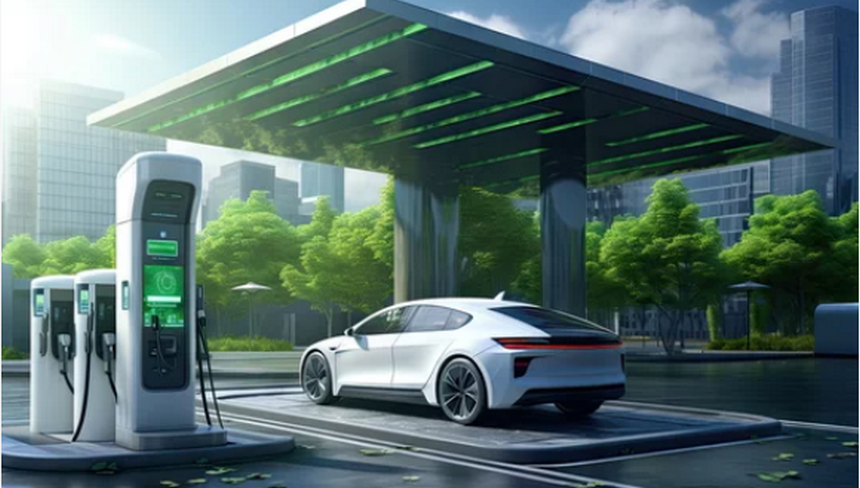The world shifts gears toward sustainable transportation. Electric vehicles (EVs) lead the charge. Global sales hit 14 million in 2023, up 35% from 2022. Governments push incentives. Tech giants pour billions into batteries. Yet volatility lingers. Is this the right time for electric vehicle investment? This 2025 analysis weighs EV risks against massive upside. From stocks to startups, we break it down. Make informed moves in this booming sector.
The Booming EV Market: Why Invest Now?
EVs aren’t a fad. They’re the future. By 2030, 45% of new cars could be electric, per BloombergNEF. China dominates with 60% market share. Europe mandates phase-outs of gas cars by 2035. The U.S. Inflation Reduction Act pumps $369 billion into clean energy.
Electric vehicle investment taps multiple angles. Buy Tesla stock. Fund battery firms. Back charging networks. Returns shine: Tesla up 1,000% since 2020. Rivian IPO soared 67% day one. Early backers in lithium miners like Albemarle saw 300% gains. For green portfolio tips, see our green investing guide.
Rewards of Electric Vehicle Investment
Gains go beyond hype. Let’s unpack the upsides.
Explosive Growth Potential
EV sales double every few years. McKinsey predicts $1 trillion market by 2030. Automakers commit: Ford $50 billion, GM $35 billion by 2025. Legacy players like VW invest €180 billion. Sustainable transportation drives this shift. Investors ride the wave.
Government Incentives and Policies
Subsidies sweeten deals. U.S. offers $7,500 tax credits per EV. EU carbon taxes punish gas guzzlers. China mandates NEV credits. These policies boost demand. They de-risk electric vehicle investment. Infrastructure booms too—1.5 million public chargers by 2025.
Cost Reductions and Tech Advances
Battery prices fell 89% since 2010. They hit $132/kWh in 2023. Parity with gas cars nears by 2026. Solid-state batteries promise 50% more range. Autonomy adds value—Tesla’s FSD subscription hits $12,000. EV risks shrink as tech matures.
Environmental and Social Wins
EVs cut CO2 by 50% over lifecycle. Cities breathe cleaner air. ESG funds flock—$2.7 trillion in sustainable assets. Align profits with planet via sustainable transportation.
Key EV Risks to Watch in 2025
No investment lacks pitfalls. EV risks loom large.
Supply Chain Bottlenecks
Lithium, cobalt, nickel shortages spike prices. 2023 lithium costs rose 400%. Mines take 7–10 years to develop. Geopolitics add tension—China controls 70% refining. Delays hit production; stocks dip. For supply insights, read Bloomberg’s EV metal shortages report.
Intense Competition and Market Saturation
Over 500 EV models by 2025. Startups flood in. Price wars erupt—Tesla slashed 20% in 2023. Margins thin. Legacy firms catch up; Ford’s F-150 Lightning outsells Rivian. Electric vehicle investment faces winner-takes-most dynamics.
Charging Infrastructure Gaps
Range anxiety persists. Public chargers cover 20% of needs in rural areas. Grid strain from peak charging could raise utility rates. Governments lag—U.S. NEVI funds deploy slowly.
Regulatory and Policy Shifts
Subsidies phase out. Trump-era policies threatened credits in 2024 talks. EU delays bans. EV risks include sudden reversals. Trade wars hit—U.S. tariffs on Chinese batteries.
Battery Tech and Safety Concerns
Fires, though rare (1 in 10 million vs. gas 1 in 1,300), scare buyers. Recycling lags—90% batteries landfilled by 2030 without action. Tech obsolescence: Today’s packs outdated in five years.
Top Electric Vehicle Investment Opportunities
Diversify across the ecosystem.
Established Players
Tesla (TSLA): $800 billion market cap. Dominates U.S. with 50% share. Robotaxi potential. BYD (China): Warren Buffett-backed, outsells Tesla globally.
Emerging Automakers
Rivian (RIVN): Amazon-backed trucks. Lucid (LCID): Luxury sedans with 500+ mile range. Nio (NIO): Battery swap tech in China.
Battery and Materials
QuantumScape (QS): Solid-state breakthrough. Albemarle (ALB): Lithium giant. Panasonic: Tesla’s partner.
Charging Networks
ChargePoint (CHPT): 200,000+ ports. EVgo (EVGO): Fast chargers. Pair with our EV charging stocks analysis.
ETFs for Broad Exposure
Global X Autonomous & Electric Vehicles (DRIV). iShares Self-Driving EV (IDRV). Low fees, diversified electric vehicle investment.
Comparison: EV Stocks Performance 2023–2025
| Company | 2023 Return | 2025 YTD | P/E Ratio | Risk Level |
|---|---|---|---|---|
| Tesla | +102% | +25% | 70 | Medium |
| Rivian | -80% | +15% | N/A | High |
| Lucid | -65% | +10% | N/A | High |
| Albemarle | +20% | -5% | 8 | Low |
| ChargePoint | -75% | +8% | N/A | High |
*Data as of October 2025. Past performance no guarantee.
How to Mitigate EV Risks in Your Portfolio
Play smart.
- Diversify: Mix stocks, ETFs, bonds.
- Long-term horizon: Hold 5–10 years.
- Research fundamentals: Revenue growth, cash burn.
- Hedge with commodities: Lithium futures.
- Monitor policies: Track IRA, EU Green Deal.
Avoid all-in bets on unproven startups. Balance with sustainable transportation leaders.
Real Investor Stories
Win: Sarah invested $10k in Tesla 2020. Now $150k. Reinvested dividends in BYD.
Loss: Mike bought Nikola at peak. Down 95%. Lesson: Verify tech claims.
Balanced: Tom’s DRIV ETF up 40% since 2022. Steady amid volatility.
Environmental Impact: Beyond Profits
Electric vehicle investment fights climate change. EVs save 1.5 tons CO2 yearly per driver. Scaled, they cut transport emissions 20% by 2050. But mining impacts land, water. Ethical sourcing matters—choose responsible firms.
The Road Ahead for Sustainable Transportation
2030 milestones: 60% EV sales. Battery costs under $100/kWh. Autonomy level 4 widespread. EV risks fade as adoption normalizes. Hydrogen, flying taxis emerge—but EVs dominate.
Learn more at BNEF’s EV Outlook.
Conclusion: Charge into EV Investing Wisely
Electric vehicle investment offers thrilling rewards amid EV risks. Growth, incentives, tech fuel upside. Supply, competition, policies pose downsides. Bet on sustainable transportation leaders like Tesla, diversified ETFs.
Start small. Research deeply. The EV revolution accelerates—position now for tomorrow’s gains. What’s your top EV pick? Comment below.







